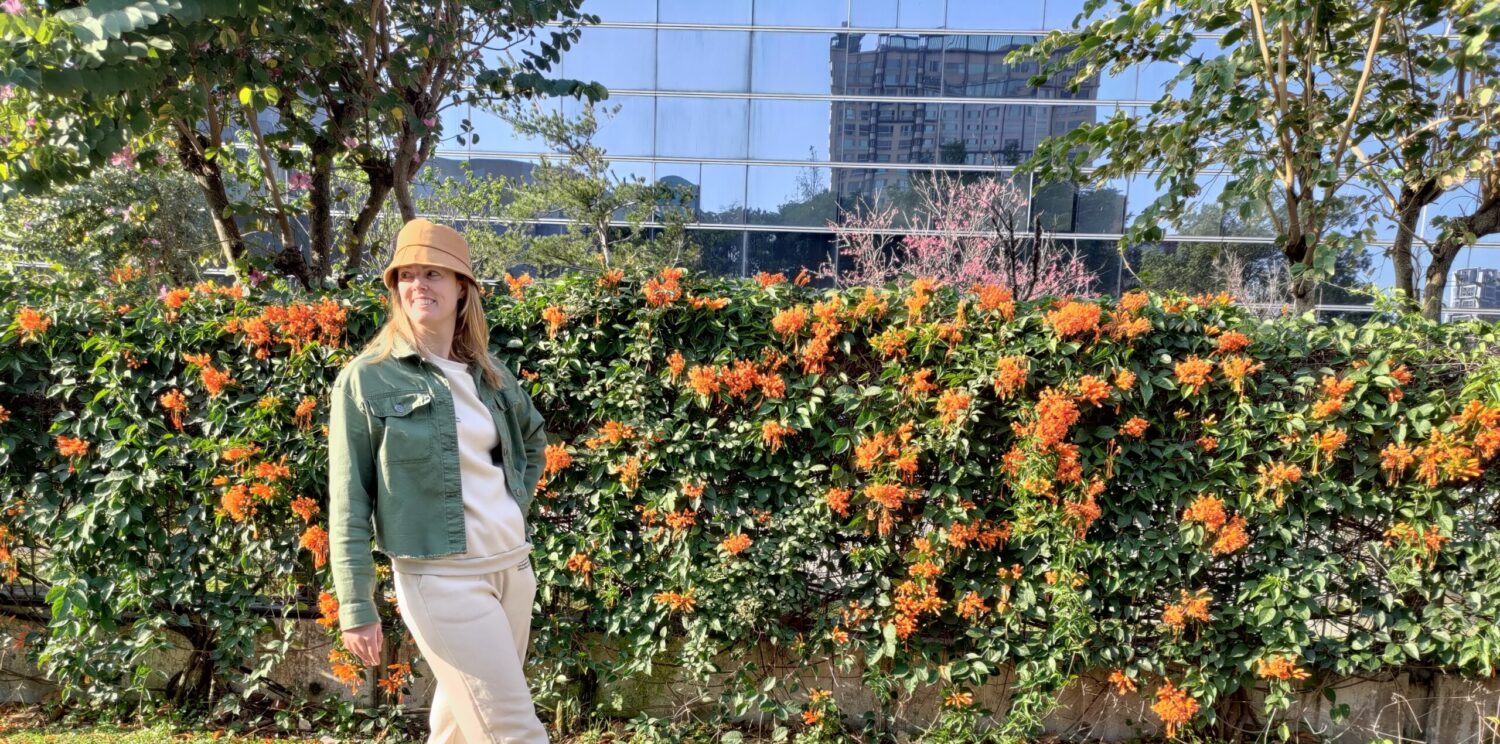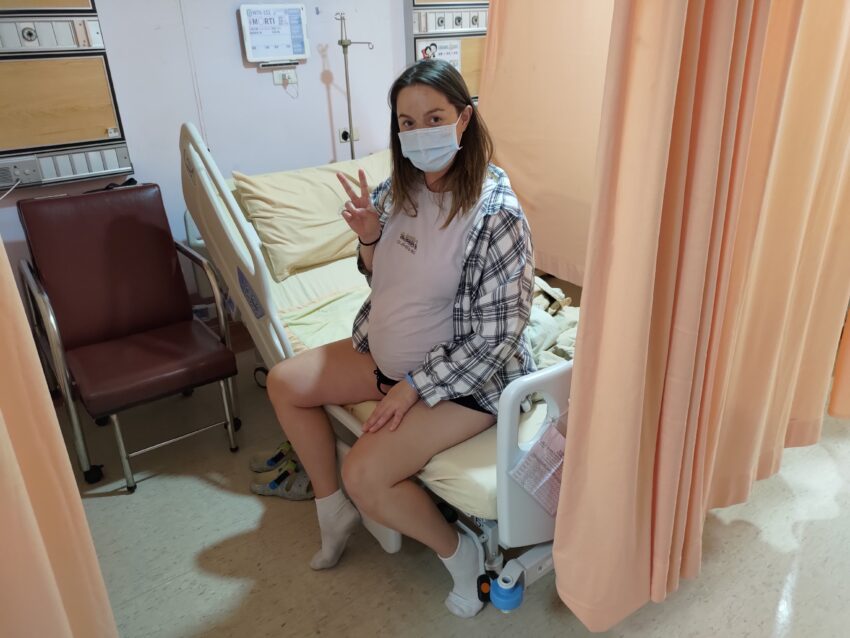I recently gave birth to my son via scheduled c-section in Taiwan. To help any other future mothers or fathers out there, here’s the cost breakdown, what to expect, and some helpful tips about getting the baby an ARC and health insurance.
Here you can see a quick Taiwanese hospital room tour.
Finding an OBGYN for your pregnancy
There are two important considerations when finding an OBGYN for your pregnancy.
First, do you want to go to a clinic, small hospital, or a large hospital? Clinics and small hospitals generally have shorter wait times for appointments. But if you have a pregnancy complication you might be sent to a hospital anyway.
Second, do you like your doctor? I tried two hospitals in Taichung. I started out at Tai An Hospital, which specializes in women and children. I loved the super short wait times here and the fact that I could easily make an appointment the night before or just show up and be seen by a doctor quickly. However, when I experienced some pregnancy complications, my Tai An OBGYN suggested I go to a bigger hospital. Also, while I really liked one of the doctors I was seeing at Tai An Hospital, I was frustrated with a few of the others who I had to see when I was experiencing complications. I personally felt that some of the advice was old-fashioned and annoying, such as when I was put on bed rest even though the doctors didn’t know what was wrong with me. I also faced some frustrating comments at Tai An about my age (I was 34 at the beginning of my pregnancy).
I switched to Taichung Veterans General Hospital midway through my pregnancy. The wait times here could be very long (it could take a whole afternoon to be seen by a doctor), but I liked my OBGYN here significantly more. I also found that the English level of the nurses and other staff here was much higher. We decided to have our baby at Taichung Veterans General.
If I had had an uneventful pregnancy, I probably would have stayed at Tai An hospital simply for the short wait times and ease of seeing a doctor quickly, but I don’t regret the switch because I liked my OBGYN at Taichung Veterans General Hospital more.
It’s important to make sure you really like your hospital/clinic and OBGYN so don’t be afraid to switch a few times if necessary.
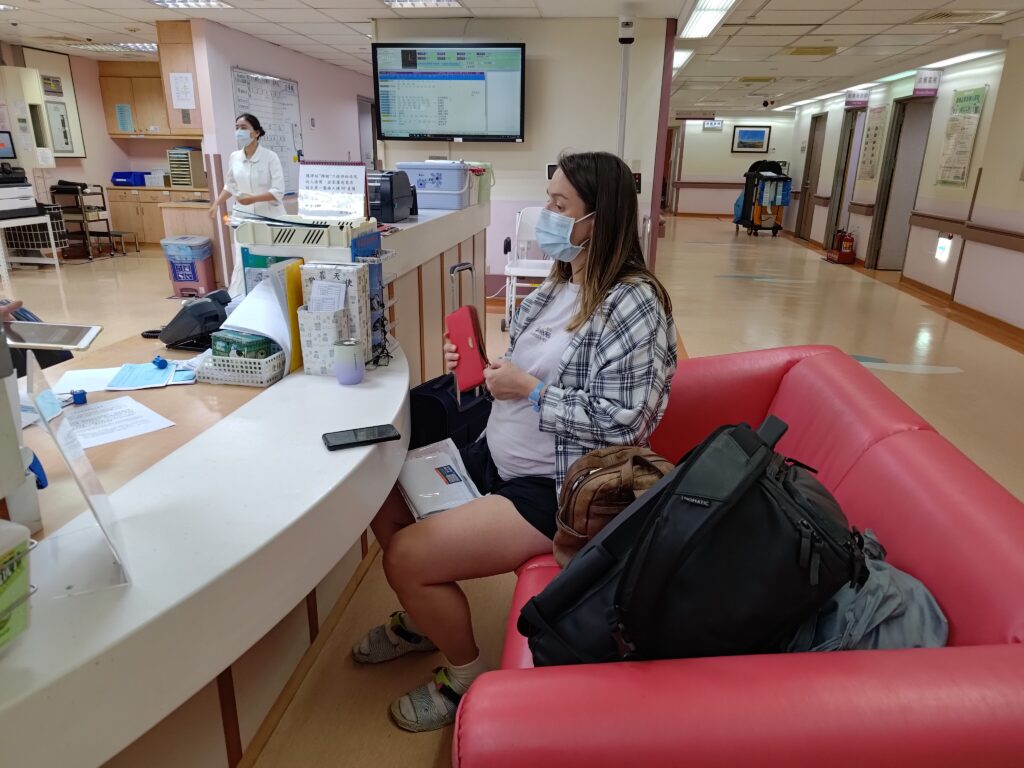
What to expect when having a c-section in Taiwan
First of all, my OBGYN performed the c-section which was super reassuring. We scheduled the c-section for 39 weeks. Due to my baby being breech, we were given the option of an ECV, but due to the baby’s positioning on my placenta and the fact that he was experiencing some worrying growth restriction, we decided against this. We waited until 39 weeks in the hopes that our son would move on his own, but he didn’t. If you have a breech baby in Taiwan, doctors will encourage you to get a c-section at 38 or 39 weeks in order to avoid going into labor on your own.
Before the c-section you will need to have a number of tests done and you will need to complete some paperwork in the anesthesia department of the hospital. About a week or two before my c-section I had several blood tests done, a urine test, and I filled out paperwork with the anesthesiologist as well as had a conversation with her. All of these tests took several hours to complete.
The night before my c-section I checked into the hospital. We filled out some paperwork and my husband and I were admitted into our shared room. That night the nurses put a cannula in my arm in case I’d need a blood transfusion the next day. Other than that I’m not entirely sure why I had to spend the night before my surgery in the hospital. I’m not sure if all hospitals in Taiwan do that, but it honestly wasn’t the best because I wasn’t rested at all for surgery the next day.
From midnight on I was not allowed to eat or drink anything, even water. My c-section was scheduled for 8 AM the next morning. I had a protein bar and a Fin drink around 11 PM to tide me over.
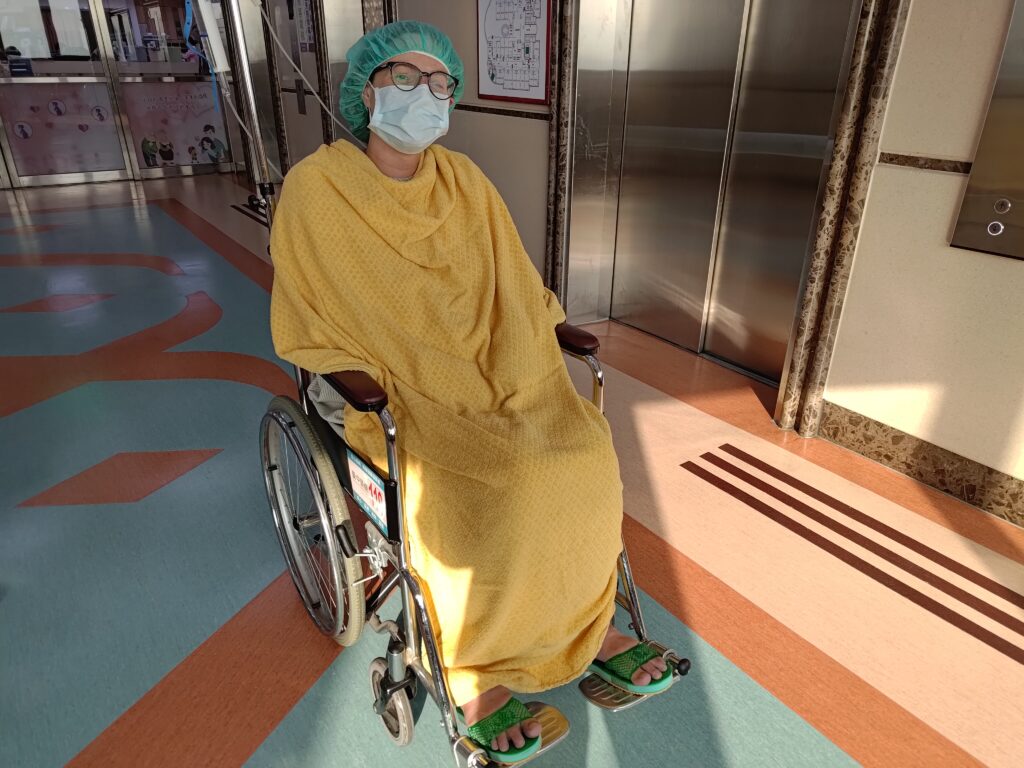
That morning I went down to surgery. My husband was not allowed to come in with me. He had to wait in the hallway with other family members whose family were also getting surgery done.
I went into surgery with the nurses and anesthesiologist and had a spinal block and a catheter put in.
The c-section itself went very smoothly. The nurses all spoke a little English and were playing K-pop when I came into the room. The anesthesiologist chatted with me and kept me calm the whole time. The surgery was very peaceful, everyone was chatty and kind, and I really couldn’t have asked for more when it came to the actual surgery.
I paid extra for pain relief to be delivered through the spinal block, which doesn’t matter during the c-section because the spinal block already handles the pain during surgery, but it meant that I’d have long-lasting pain relief after the surgery. I also had anti-nausea drugs delivered through the spinal which also cost extra (I’ll break down the costs in the next section). I opted for these because my hospital only offered Aleve/naproxen and morphine as pain relief for after the c-section. I’ve had morphine via IV before and it made me extremely nauseous and dizzy. My doctor suggested the pain relief be offered via the spinal to cut down on nausea.
I also paid extra for “barrigel” during surgery which means that I had no visible stitches after the surgery. The barrigel is supposed to lessen scarring.
In theory, my hospital was supposed to offer skin-to-skin with my baby after the c-section, but my baby was put in NICU and I was only able to glimpse him before he was brought to NICU, which honestly was pretty heartbreaking. I think the hospital was being overly cautious in this case, and I wish I’d been offered the chance to hold him or see him for longer as my baby was not in an emergency situation. In this case it would have been very nice to have my husband in the room because he might have been able to advocate that I be allowed to hold him before he was whisked away, but if you’re in surgery by yourself it’s nearly impossible to make decisions like that.
Overall the surgery went smoothly, all the staff were lovely, and I’m glad that I opted for pain relief and nausea relief to be delivered through the spinal, but I was annoyed that I couldn’t have my husband in the room to advocate for me and baby while I was in such a vulnerable state.
Cost of c-section
I’m going to put my receipt for the visit here. You can see on the left the cost without health insurance and on the right the cost after the NHI covered most things.
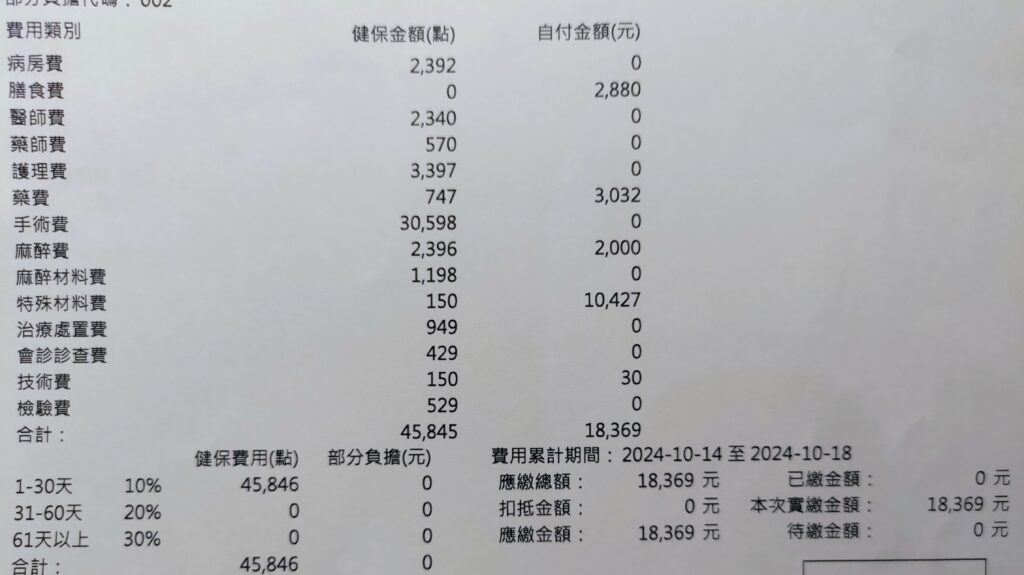
If your c-section is “necessary,” which basically means that a doctor is recommending it for a variety of reasons, then the c-section and spinal block will be covered by NHI. Ask your doctor what constitutes a “necessary” c-section.
In total we paid 18,369 yuan.
The c-section and spinal block were covered due to my baby being breech. The shared three-person bedroom was free through Taiwan’s National Health Insurance.
The extra costs came from…
…the meals we ate at the hospital. My husband had the basic hospital meals, which cost less than 200 a day for breakfast, lunch, and dinner. I had the postpartum meals, which cost 880 a day. I highly recommend the postpartum meals if you can afford them. They were delicious and there was enough food that my husband probably could have skipped his meals and just shared mine. The basic hospital meals were fine but smaller. They typically included rice, meat, and vegetables. We paid 2880 total for food. Below is a picture of one postpartum meal including the soup on the left and fruit on the right.
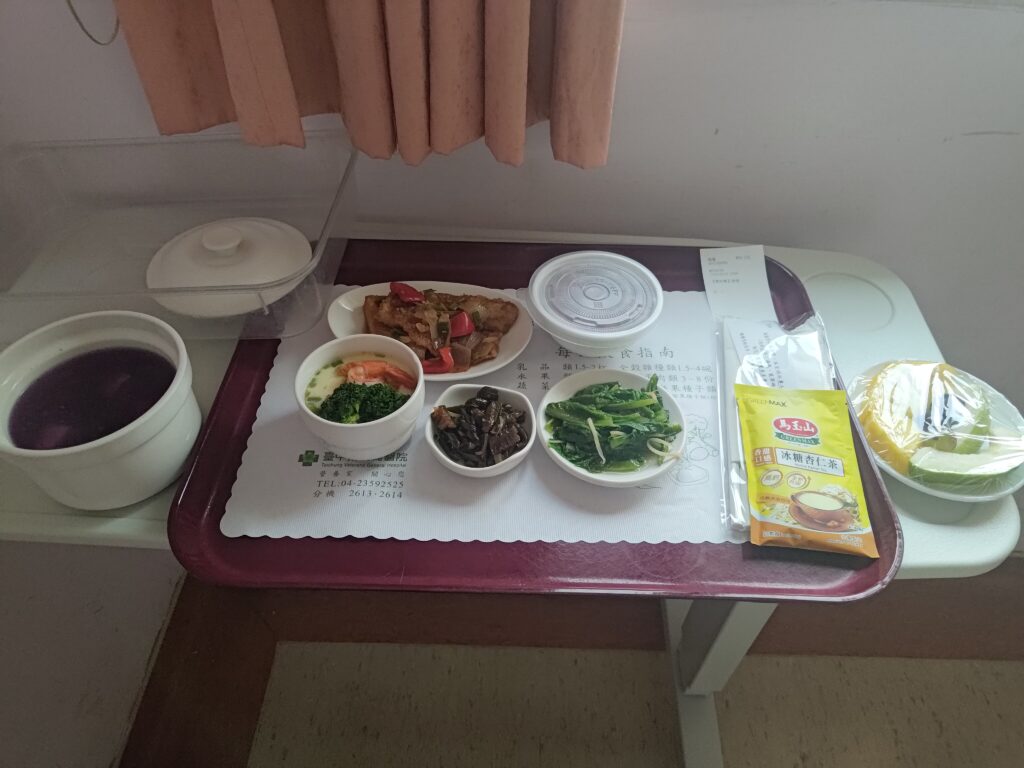
The other costs you see were for the extra pain relief delivered via spinal block (approx. 2000 NTD), the optional anti-nausea meds through the spinal block (less than 500 NTD), a few special waterproof bandages that I could wear for five days at a time (approx. 1000 NTD), an optional medicine used to prevent bleeding/hemorrhaging (a consistent problem throughout my pregnancy) which cost about 3000 NTD, and the Hanbio Barrigel to close the wound and prevent scarring which cost 8250 NTD. I also paid a little extra for things like laxatives and steri-strips, but the cost of those were negligible.
All of those costs were optional.
We stayed at the hospital for four nights including the night before the surgery. We could have stayed for longer if we wanted to, but I’ll discuss why we didn’t later. It seems that after a c-section in Taiwan, staying for at least 4-6 days at the hospital is the norm and the entire stay is covered by NHI if you are in the shared rooms.
A double shared room (you and one other person) would have cost 2000-2500 NTD.
A single, private room would have cost 5000-7600 NTD.
I’m not sure why there is a range in prices. We didn’t inquire because I stayed in the three-person shared room for free.
NICU and NICU cost
My baby had to go to the NICU for four nights and five days due to being born with some fluid in his lungs.
I personally found the NICU extremely frustrating. The visiting hours were horrible. We could only see our son from 10:30-11 AM or 7-7:30 PM.
I also found that the NICU started a slew of “corrective” measures. Our son went in for fluid in his lungs. He had to stay a day and take antibiotics because the doctor was afraid the fluid was due to an infection. He had breathing tubes and a feeding tube. The first day he was being monitored while they waited for results back on tests to make sure the fluid in his lungs wasn’t caused by an infection. It was discovered that he had no infection, but he had to stay another day to make sure he could breathe without the tubes, and then another day to make sure he could eat without the feeding tube, and then he had minor jaundice and had to stay another day to be monitored. And finally he didn’t have jaundice anymore, but they wanted to keep him 24 hours to make sure he didn’t get jaundice again. I finally put my foot down and signed some paperwork to say that I understood the risks, but I wanted to take my baby home anyway, so he was finally released from NICU on day 5. The doctors and nurses at the NICU seemed genuinely surprised that I wanted my baby home with me.
The cost is as follows. As you can see on the right, we opted for some testing while my son was in NICU which wasn’t covered under NHI (including things like hip dysplasia testing), but the vast majority of his stay was covered, which I am incredibly grateful for. Even though I was frustrated with his (in my opinion) largely overprotective and unnecessary stay, I’m grateful it was covered under health insurance.
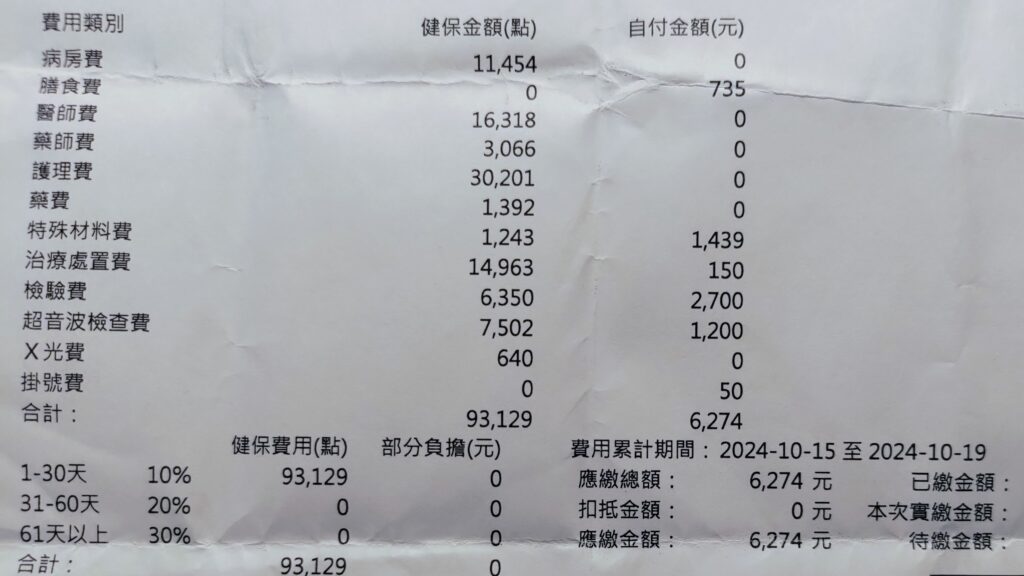
C-section recovery
After my surgery I was extremely sleepy and slept most of the rest of the day. The next morning I wanted to get up and go see my son in the NICU, but I was in a lot of pain and I still had an IV, the cannula, and the catheter in which all contributed to my discomfort. I couldn’t get any of those things removed until proving to the nurses that I could walk to the bathroom by myself. Unfortunately no one told me this, so I spent a lot of the day in extra pain due to the uncomfortable IV and catheter. When I finally asked to have them removed I was told they’d need to watch me walk to the bathroom. After some trial and error I managed. I had the IV, cannula, and catheter removed.
I was allowed a wheelchair and my husband wheeled me to the NICU the next morning.
Recovery in general was fine and quick for me. At least some of this was due to the good care and food I received as well as the skill of the surgeon, but I know a lot of c-section recovery is really just luck of the draw and unpredictable. I was lucky, and I was happy with the care I received. I felt the Aleve/naproxen pain medication was more than enough most days, although I also added acetaminophen (over-the-counter from my local pharmacy) on a few particularly sore days right after I arrived home.
Also the nurses don’t want you to go home until after you’ve done a number 2 at the hospital. I went home anyway after firmly insisting I’d never feel comfortable enough to do that until I was at home in my own bathroom.
Postpartum in a shared room
If you can afford a private room, then I highly recommend it for c-section recovery. We stayed in the three-person shared room, and if I had had a vaginal birth this would have been fine as we could have left the next day, but due to the c-section we were in the shared room for four nights which was too much.
Our roommates were polite and respectful, but it was a very small space. We were in the middle “room” which had only curtains on all sides. Nurses come in day and night, so its never dark or quiet. Everyone must have a family member staying with them, so in total there were always at least 6 people in the small space at all times. The bathroom was a typical Taiwanese wet bathroom, which felt horribly dangerous when I was unsteady on my feet after surgery. People often tracked water throughout the whole tiled hospital room after showers. Also, having three postpartum women and their families sharing one toilet was honestly pretty gross even though someone came by once a day to clean it. There was only one window on the far wall which we couldn’t see from our space, so I saw no sunlight most days.
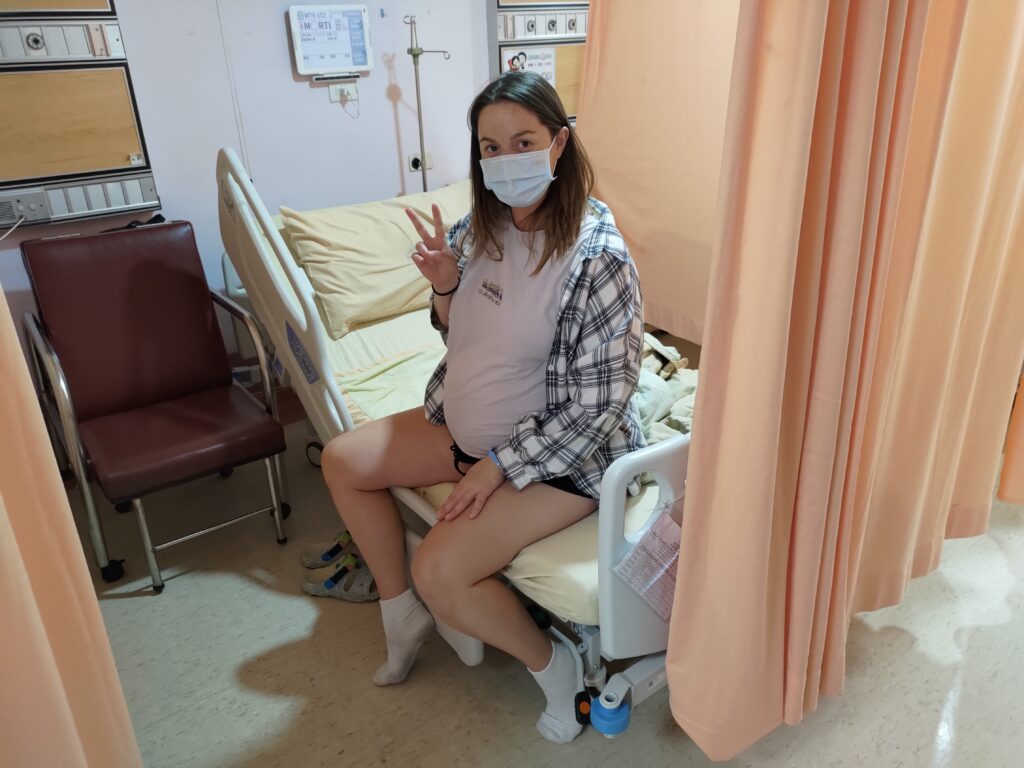
If you have to stay in one of these shared rooms for a night or two it’d be fine, but four nights was a lot and I was extremely ready to go home by the end.
Also, we had initially asked to share a room with our son before we knew he’d be sent to NICU and honestly, I’m not sure how room sharing would have worked. There was absolutely no space in our tiny curtained off area and having a newborn in the noisy room for five days would have been pretty horrible. None of the other women who came in and out during our stay opted to have their babies in the room with them.
What to bring to the hospital
The most important thing is to bring someone you trust. In Taiwan it’s expected that your family will help you at the hospital. My husband had to help with wheeling my wheelchair, getting me dressed, buying my meds, filing paperwork, putting our food trays back after meals, and everything else that you could possibly think of. I believe you can pay for a private nurse if no one can help you, but I haven’t looked into this.
We were recommended to bring a few things with us before we arrived, but we had to repurchase some of these things upon arriving at the hospital to meet the nurses and doctors standards. A lot of these things were cheap at the hospital, so I’d just wait and buy them there to avoid having to pack too much.
Note that there were large lockers in the hospital room to store your things.
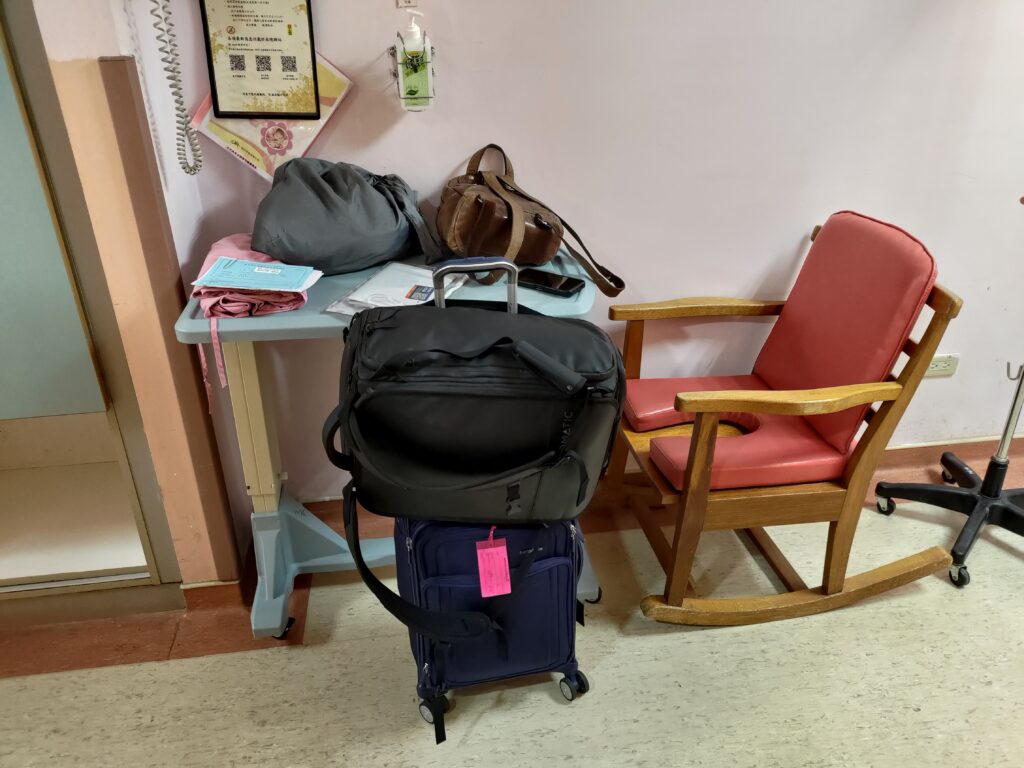
Here were the things we had to purchase or repurchase at the hospital (specifically for c-section)
-belly band for c-section (the one I had bought on Shopee didn’t meet the nurses’ standards)
-adult diapers for postpartum
-”puppy pads” for postpartum
-large waterproof bandages for c-section
Here are some things I brought from home which I was glad for including.
-extra large disposable cotton underwear (2XL can be purchased at Poya. Taiwanese sizes can be very small for a foreigner’s bum, so the hospital undies wouldn’t have fit me.)
-sanitary pads
-a blanket and pillow for my husband who slept on the cot near me
-eye masks to block out light (for me and my partner)
-ear plugs (for me and my partner)
-toiletries like toothpaste and shampoo
-waterproof slip-on shoes (slides, Crocs, flip-flops)
-compression socks (These were sooo necessary for my swollen feet! I had to order them on Amazon to get Western-sized socks. The ones on Shopee were tiny.)
-extra clothes and sweater for myself
-clothes for my husband
-snacks
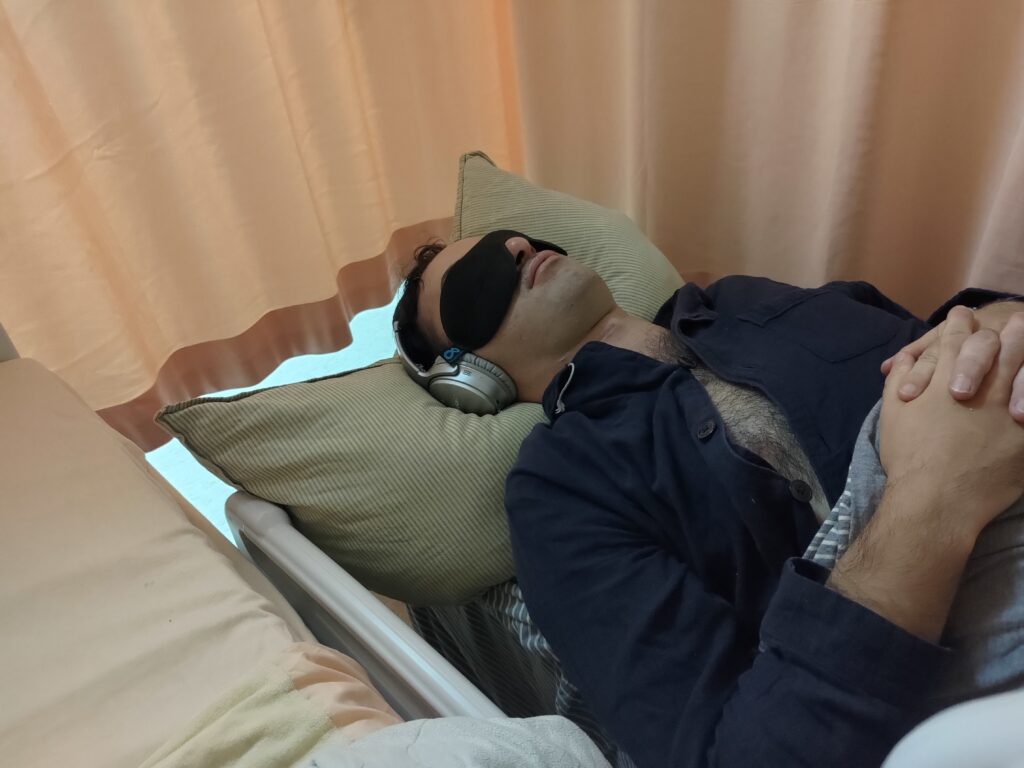
Here are some things I wish I’d brought because the hospital didn’t provide them
-an extra pillow for myself
-towels for my husband and myself
And here were the things we had to buy for our baby while he was in NICU (we purchased these at the hospital)
-newborn diapers
-diaper rash cream
-baby wipes
-pacifier
-baby formula
I don’t have the cost break down for these items, but in general they were all very affordable, even the things we bought at the hospital.
Breastfeeding and Pumping
The breastfeeding “help” at the hospital was terrible. I was in pain, my baby was in the NICU with strict visiting hours, and basically someone came into my room and aggressively squeezed colostrum out of me until I begged her to go away. I tried to go breastfeed my baby once during his NICU stay, and the nurses acted like this was a big inconvenience. After a lot of fussing to get him out of his crib and to put us in a private spot behind curtains, I then had two nurses “helping” by shoving his face at my chest before they proclaimed that he “just wasn’t hungry” and took him back.
I was afraid this was going to be a huge setback for breastfeeding and it might have been, but I found two things that helped immensely.
One, I spent about 10,000 NTD on a breast pump from Mamaway and it is amazing. It honestly works so well. It’s not 100% necessary for breastfeeding, but it was very helpful.
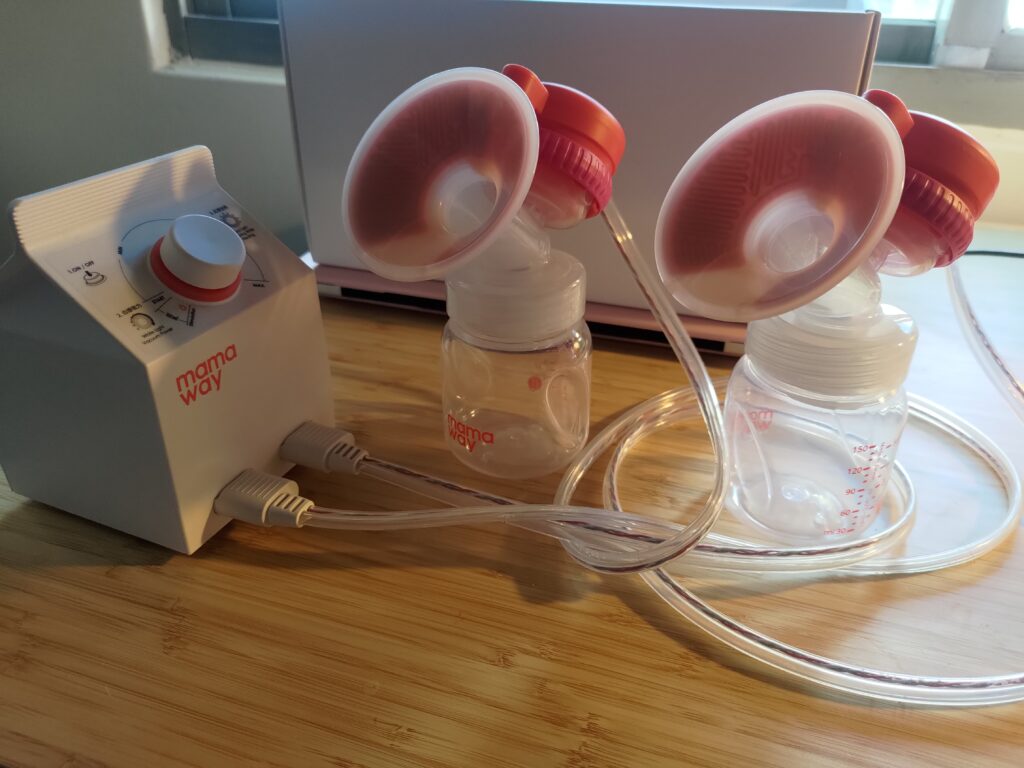
Two, I hired a private lactation consultant to come to my house. Just go to Google Maps and type in “breastfeeding” or “lactation.” For me I went with “Koko Pregnancy Care Center” in Taichung and met Vivi, who was an absolute angel. She came to my house and saved my breastfeeding with her teaching and massage. It was 3000 NTD for one session and for me it was completely necessary. I learned so much and she really saved my breasts. You might not need a breast pump, but I felt a lactation consultant at home was essential if you’re having problems.
Overall thoughts
Even though some of my experience of giving birth in Taiwan was negative, overall I was happy about quite a few things.
One, the cost
As you can see from my receipts above, National Health Insurance in Taiwan is pretty amazing.
Two, the medical side of things
I felt that all of my doctors and nurses were very professional, knew exactly what they were doing, and that I was in safe hands.
Three, kindness
I also felt that all the doctors, nurses, and volunteers were kind and very helpful.
Two negative things that I would note if you are a foreigner having a baby in Taiwan are the following…
First, I think the mental aspect of health was not really considered during my child’s birth. I think it’s important to bond with your baby which is impossible with the systems in place, especially the severely limited visiting hours in the NICU. I didn’t feel room-sharing or skin-to-skin was encouraged either. And the lack of sunlight and space in the shared rooms was also pretty soul-destroying after 5 days. I’m aware that I should be grateful because the stay was free, and I am, but I still feel the patient’s mental health should be considered more.
Second, the bureaucracy of a hospital stay in Taiwan can be both good and bad. Everything is going to be above board, which is great, and there are clear set paths for doing everything from preparing for birth to getting your child’s birth certificate; however, this can also be frustrating and might mean that you or your family member are running all over the hospital trying to get paperwork or other requirements done.
Getting baby an ARC and NHI card
If you and your partner are both foreigners, read on. (Note: The process is different if one of you is Taiwanese and involves going to the household registration office.)
For the first two months, the baby is covered under the mother’s NHI. (I think he or she could be covered under the father’s NHI if the mother isn’t covered, but I’m not 100% sure.) My NHI is the reason my child’s NICU stay was so cheap.
To get your baby covered under NHI after two months, he or she needs an ARC. To do this, get a photo of your baby with eyes open on a white background. You can print this at any print shop in Taiwan. The size is 45 mm by 35 mm. We took a photo on my phone and edited it in Canva. You also need your ARC, your passport, the child’s birth certificate (you must get both the English and Chinese birth certificate from the hospital), and if applying with your spouse, your spouse’s ARC, spouse’s passport, and (this is the most complicated bit) an authenticated copy of your marriage certificate.
We happened to have an authenticated copy of our marriage certificate already because I’m in Taiwan on a spousal visa. However, it’s a bit time-consuming and annoying to get one of these (in my experience), so definitely apply in advance of your child’s birth if you can. If you got married in the USA, then contact your “home” TECO office (mine is in Chicago) and ask them how to apply to authenticate your marriage certificate (you can email the office and send in the application material via mail). If you’re from another country, then contact the Taiwanese representative office in your home country.
Bring all of the above to the immigration (ARC) office. They’ll complete the baby’s birth certificate there. (The Chinese birth certificate from the hospital will likely still be incomplete when you leave the hospital.) The immigration people help you apply for the ARC. Then you wait 2 weeks and go pick the ARC up at the office.
Then send the ARC to whoever is in charge of your health insurance. If you or your spouse is employed and has insurance through your employer, then that’s who you send it to. Your employer will apply for your baby’s insurance.
That’s it!
And I think that’s everything. Hopefully that colossal information dump helps someone. Overall I’m so grateful that my son and I are healthy and that I live in a place where the cost of having a baby is so cheap.
